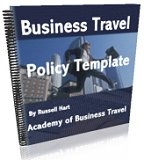I am some times asked about pricing and billing for consulting services. One of the sticky points is:
Basically the question comes down to what have you negotiated with the client or the consultant. There are two parts to travel, a) the out of pocket expenses incurred by the consultant and b) the consultant's time consumed by traveling.
Out of Pocket Expense
Based on my experience and practice, the out of pocket for travel (transportation, food and lodging), if an over night is required, is billed to the client at some agreed upon standard rate such as federal per diem rates. If necessary these can be backed up with actual receipts justifying actual cost, or at predetermined daily rate or allowance, or some variation of both.. The federal rates are a good reference source since they take into account the cost of living in different cities and countries.
Consultant's Time
Depending upon whether you are a sole proprietor (self employed) consultant or are hiring one, the time engaged in travel is a cost of doing business and should be reflected in the pricing formula used by the consultant to compute his/her a daily or hourly rate. The travel time is overhead, in my view, and therefore is part of cost to be recovered from the hourly rate and hours actually worked for the client. As long as both parties agree to the rate for actual work/service done for the client, it is really no concern to the client how that rate was determined. On the other hand, the consult should be aware of what his/her costs are and how much (how many billable hours) time and at what rate he/she must sell to breakeven per period.
The travel time is a shared expense rather than as a paid vacation. The consultant should not travel unless a.) he is assured that there is paying assignment at the other end; and/or b.) she is willing to consider and accept the risk that the travel is a marketing (overhead) expense to the consulting practice rather a paid junket.
Consulting Firm and Travel
If you are hiring an established consulting firm, or work for one, there should be established policies in place for dealing with these contingencies. These policies should be discussed prior to the sale/purchase of the consulting services and be incorporated into the consulting contract. The responsibilities of each party should be clearly set out in the contract before work begins.
Mission Creep
Beware of mission creep. Mission creep is when the client expects a little more effort without paying for it; or when the consultant wants to extend the billable time because he/she low balled the project.
Over-billing or Underpaying for Travel
A final observation, to charge a client for the travel may seem like a great idea for the consultant. However, it is really only a very short term benefit. If the client is at all dissatisfied with the work and then sees two days of "travel" time padding the invoice -- it may be the last time you hear from the client or any of his/her contacts.
The client who requires the consultant to travel from point A to point B in the client's interest, but refuses to pay for the time that the consultant must take away for "meaningful" work is cheating the consultant of billable hours that might be more productively spend on the project or for another client.
Travel while under contract
One area of mission creep and under/over billing takes place is paying the consultant's travel time, while under contract.
Sometimes the consultant is asked to travel to an event at the request of the client, or if you are the client, you want the consultant to accompany or represent you at an event. If this case, the consultant should be paid for his/her time on route and return from the event. If the travel was unanticipated when the contract was negotiated and signed, the consultant may have under bid the assignment and an amendment to the scope of work and the time should be negotiated.
For example, if a consultant is asked to attend a conference or workshop for the client, and then is expected to prepare a report or conduct a local training session for the client and their staff based on the conference/workshop, the time the consultant spends in transit is part of the cost that client should be expected to pay.
In this case, the consultant's activity is part of a larger mission, research or training the trainer. The client gains because they are paying for only one person (an expert) to attend the event. As a result the client obtains an expert's evaluation of the data/event, or prepared the consultant to train the staff locally. The client gains by saving registration, travel, and down time expenses that the client would have incur by sending staff to the event.
BASIC PRINCIPLE
1. If the consultant is required to travel before a contract is negotiated and signed with a client, then the consultant's time is his/her responsibility.
2. If the travel is required after the contract has been signed and the travel is required by the client, then the consultant's time in transit should be billable to the client.
3. As far as reimbursement for out of pocket expenses, pre-contract expenses should be negotiated or assumed by the consultant while out of pocket expenses incurred while under contract should be billable (reimbursed) by the client.
Who pays for travel and travel time?"
Basically the question comes down to what have you negotiated with the client or the consultant. There are two parts to travel, a) the out of pocket expenses incurred by the consultant and b) the consultant's time consumed by traveling.
Out of Pocket Expense
Based on my experience and practice, the out of pocket for travel (transportation, food and lodging), if an over night is required, is billed to the client at some agreed upon standard rate such as federal per diem rates. If necessary these can be backed up with actual receipts justifying actual cost, or at predetermined daily rate or allowance, or some variation of both.. The federal rates are a good reference source since they take into account the cost of living in different cities and countries.
Consultant's Time
Depending upon whether you are a sole proprietor (self employed) consultant or are hiring one, the time engaged in travel is a cost of doing business and should be reflected in the pricing formula used by the consultant to compute his/her a daily or hourly rate. The travel time is overhead, in my view, and therefore is part of cost to be recovered from the hourly rate and hours actually worked for the client. As long as both parties agree to the rate for actual work/service done for the client, it is really no concern to the client how that rate was determined. On the other hand, the consult should be aware of what his/her costs are and how much (how many billable hours) time and at what rate he/she must sell to breakeven per period.
The travel time is a shared expense rather than as a paid vacation. The consultant should not travel unless a.) he is assured that there is paying assignment at the other end; and/or b.) she is willing to consider and accept the risk that the travel is a marketing (overhead) expense to the consulting practice rather a paid junket.
Consulting Firm and Travel
If you are hiring an established consulting firm, or work for one, there should be established policies in place for dealing with these contingencies. These policies should be discussed prior to the sale/purchase of the consulting services and be incorporated into the consulting contract. The responsibilities of each party should be clearly set out in the contract before work begins.
Mission Creep
Beware of mission creep. Mission creep is when the client expects a little more effort without paying for it; or when the consultant wants to extend the billable time because he/she low balled the project.
Over-billing or Underpaying for Travel
A final observation, to charge a client for the travel may seem like a great idea for the consultant. However, it is really only a very short term benefit. If the client is at all dissatisfied with the work and then sees two days of "travel" time padding the invoice -- it may be the last time you hear from the client or any of his/her contacts.
The client who requires the consultant to travel from point A to point B in the client's interest, but refuses to pay for the time that the consultant must take away for "meaningful" work is cheating the consultant of billable hours that might be more productively spend on the project or for another client.
Travel while under contract
One area of mission creep and under/over billing takes place is paying the consultant's travel time, while under contract.
Sometimes the consultant is asked to travel to an event at the request of the client, or if you are the client, you want the consultant to accompany or represent you at an event. If this case, the consultant should be paid for his/her time on route and return from the event. If the travel was unanticipated when the contract was negotiated and signed, the consultant may have under bid the assignment and an amendment to the scope of work and the time should be negotiated.
For example, if a consultant is asked to attend a conference or workshop for the client, and then is expected to prepare a report or conduct a local training session for the client and their staff based on the conference/workshop, the time the consultant spends in transit is part of the cost that client should be expected to pay.
In this case, the consultant's activity is part of a larger mission, research or training the trainer. The client gains because they are paying for only one person (an expert) to attend the event. As a result the client obtains an expert's evaluation of the data/event, or prepared the consultant to train the staff locally. The client gains by saving registration, travel, and down time expenses that the client would have incur by sending staff to the event.
BASIC PRINCIPLE
1. If the consultant is required to travel before a contract is negotiated and signed with a client, then the consultant's time is his/her responsibility.
2. If the travel is required after the contract has been signed and the travel is required by the client, then the consultant's time in transit should be billable to the client.
3. As far as reimbursement for out of pocket expenses, pre-contract expenses should be negotiated or assumed by the consultant while out of pocket expenses incurred while under contract should be billable (reimbursed) by the client.




